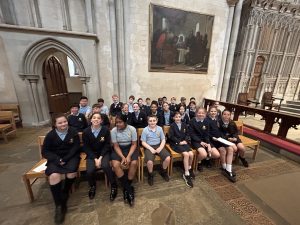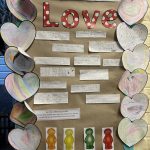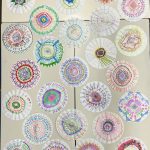Aims
At Abbey CE VA Primary School, our aim is to develop pupils’ knowledge and understanding of the religions and beliefs which form part of our diverse society. Following the Bedford Borough and Central Bedfordshire Agreed Syllabus, we believe that Religious Education helps pupils explore different religious traditions while reflecting on their own ideas and values. Our curriculum aims to ensure every child develops religious literacy, understands the importance of belief in people’s lives, and respects different faiths and worldviews. We strive to create thoughtful pupils who can engage with religious and philosophical questions while developing their own insights.
How We Teach Religious Education
RE plays a significant role in the personal development of children and is at the heart of the curriculum here at Abbey CE VA School. At its core is the intention of enabling children to become “religiously educated” to face the demands of the contemporary world. Given the opportunities for encountering people of different beliefs and lifestyles, RE also has a key role to play in fostering respect and social cohesion.
In addition to being “religiously educated”, RE helps students to become “skilled cultural navigators”, able to handle the differences of faith and belief around them and to establish their own sense of identity and belonging. Through the curriculum, children are encouraged to develop a curiosity to learn about other people’s beliefs and cultures, and to find the common threads which bind them together.
The RE curriculum here at Abbey CE VA School is based on the Bedford Borough and Central Bedfordshire Agreed Syllabus. This syllabus aims to embed the ‘Understanding Christianity’ resource with the key purpose of supporting pupils in developing their own thinking and their understanding of Christianity, as a contribution to their understanding of the world and their own experience within it. This is supplemented by material from The Emmanuel Project to create a coherent programme of study for RE across the school. In addition to the focus on Christianity, each year group learns about and evaluates their own views on other world religions and non-faith.
Spiritual education in RE is concerned with becoming a person in the fullest sense. It can encourage our journey towards an understanding of ourselves, God the creator, and the wonder of the world around us.
Moral education in RE relates to the child’s understanding of what is ‘right’ and ‘wrong’. As children mature, they will also develop an awareness of what is fair and just. They will be able to apply their thinking to circumstances beyond their own immediate surroundings. RE encourages students to discuss ideas such as people’s responsibility towards the world and generations to come. In RE, children are encouraged to make a personal response to right and wrong, and to consider a range of responses to moral issues.
Social education in RE refers to a child’s ability to understand and play their part within school, the wider community and later, in wider society. RE teaching involves exploring the similarities and differences in religions and cultures though which children make links between faith and personal action in everyday life. Social development represents the abilities and qualities that an individual needs to play a full and active part in society.
Cultural education in RE allows a child to recognise that all cultural groups are distinctive. At Abbey CE VA School, we celebrate the enrichment of the total community which flows from diversity of age, gender, racial and social origins, abilities, culture and religion. We are committed to ensuring that all are given every opportunity to develop their talents to the full. Culture is the embodiment of shared beliefs, knowledge, customs and values of that group. Children need to appreciate the distinctive features of their own culture and those of others.
Teachers deliver RE through:
- Exploration of key religious concepts
- Study of sacred texts and stories
- Discussion of beliefs and practices
- Investigation of religious artefacts
- Visits to places of worship
- Meeting members of faith communities
- Creative and reflective activities
RE is taught through an enquiry-based approach, encouraging pupils to ask questions and explore different viewpoints. We create opportunities for pupils to engage with religious material first hand and learn from people of faith.
Assessment focuses on both knowledge and understanding of religious traditions and the ability to reflect on and respond to religious and ethical questions.
At Abbey School we have very strong links with St Albans Cathedral. Every week, the whole school attends a service run by the clergy. We also attend other regular services at the Cathedral throughout the school year.
What Skills and Knowledge Will Your Child Learn?
Throughout their time at Abbey, pupils develop essential knowledge and skills in religious education. In the early years, children explore religious stories, celebrations, and symbols, beginning to understand how these are important to believers.
As they progress, pupils develop understanding across key areas:
Knowledge and Understanding of Religions:
- Christianity as the main tradition studied
- Judaism, Islam, Hinduism, Sikhism and Buddhism
- Key beliefs and teachings
- Religious practices and lifestyles
- Ways of expressing meaning
- Religious festivals and celebrations
- Sacred texts and stories
Religious and Philosophical Enquiry:
- Asking ultimate questions
- Expressing own beliefs
- Making comparisons between religions
- Understanding different viewpoints
- Exploring ethical issues
- Reflecting on meaning and purpose
- Developing reasoned opinions
Personal Response and Reflection:
- Exploring own beliefs and values
- Responding to religious material
- Understanding different perspectives
- Developing respect for others
- Making personal connections
- Considering life’s questions
- Forming own views thoughtfully
By Upper Key Stage 2, pupils will have developed:
- Knowledge of major world religions
- Understanding of religious concepts
- Skills in theological thinking
- Respect for different beliefs
- Ability to discuss religious questions
- Knowledge of local faith communities
- Understanding of religious diversity
These skills and knowledge progress systematically through the year groups, following the Agreed Syllabus requirements:
Key Stage 1:
- Christianity and Judaism
- Religious stories and their meanings
- Celebrations and festivals
- Places of worship
- Religious symbols
- Prayer and worship
Lower Key Stage 2:
- Christianity and Hinduism
- Religious leaders and teachers
- Sacred texts
- Religious values
- Worship and devotion
- Religious expression
Upper Key Stage 2:
- Christianity and Islam
- Religious beliefs and questions
- Faith in action
- Ethics and moral issues
- Religious diversity
- Ultimate questions
Through our RE curriculum, pupils learn to:
- Understand religious concepts
- Respect different beliefs
- Ask profound questions
- Think critically
- Express personal views
- Make informed responses
- Appreciate diversity
We believe these skills and knowledge are essential for pupils to develop as informed, respectful individuals who understand the importance of belief in people’s lives and can engage thoughtfully with religious and ethical questions.
Curriculum Overview
- RE Curriculum Overview (227.87KB)
Progression of Skills
- RE Progression of Skills (103.95KB)
Syllabus
Other documents
- Progression of Knowledge Christianity (168.45KB)
- Progression of Knowledge Hinduism (64.51KB)
- Progression of Knowledge Islam (138.23KB)
- Progression of Knowledge Judaism (137.39KB)

Spirited Arts Competition
Spirited Arts is an art and poetry competition run by NATRE (National Association of Teachers of RE). Children were asked to produce a piece of

Year 6 Cathedral Away Day
We had a fantastic day at the cathedral exploring what spirituality means to us through the use of music, silence, discussion and artwork. We reflected




